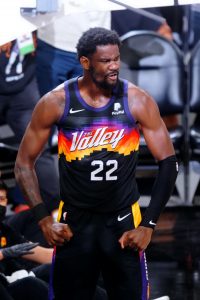The NBA’s rookie scale, which determines the salaries first-round picks earn during their first four seasons, also dictates how much the qualifying offers will be worth for those players when they reach restricted free agency after year four. However, the value of those qualifying offers can fluctuate depending on whether or not a player has met the “starter criteria.”
Here’s how the starter criteria works in a typical year:
- A player who is eligible for restricted free agency is considered to have met the starter criteria if he plays at least 2,000 minutes or starts 41 games in the season before he reaches free agency.
- A player can also meet the criteria if he averages either of those marks in the two seasons prior to his restricted free agency. For instance, if a player started 50 games one year and 32 the next, he’d meet the starter criteria, since his average number of starts over the last two seasons is 41.
The first method of meeting the starter criteria will remain unchanged this season, but that second method will look a little different due to the truncated nature of the 2020/21 season.
For starter criteria purposes, the number of starts and minutes a player logged last season will be prorated upward by 82/72 to account for the 72-game schedule, Hoops Rumors has learned.
 For example, Suns center Deandre Ayton started 69 games last season. Typically, Ayton would require 13 more starts this season to meet the starter criteria, since 82 total starts would get him to the required average of 41 over the last two seasons.
For example, Suns center Deandre Ayton started 69 games last season. Typically, Ayton would require 13 more starts this season to meet the starter criteria, since 82 total starts would get him to the required average of 41 over the last two seasons.
However, Ayton’s 69 starts last season came in just 72 regular season games. Prorated across a typical 82-game schedule, he would’ve made 78 starts. That means he’ll only need four starts this season to meet the starter criteria. In other words, he should get there next Wednesday, barring an injury.
Hornets forward Miles Bridges, meanwhile, only started 19 games last season, but he played 1,932 total minutes in Charlotte’s 72 games. That works out to 2,200 minutes when prorated across an 82-game schedule, meaning he’d require just 1,800 more this season in order to meet the starter criteria. Since he’s part of the Hornets’ starting five now, Bridges could also meet the criteria by simply getting to 41 starts in 2021/22.
A player’s ability or inability to meet the starter criteria can affect the value of the qualifying offer he receives as a restricted free agent, as follows:
- A top-14 pick who does not meet the starter criteria will receive a qualifying offer equal to the amount the 15th overall pick would receive if he signed for 120% of the rookie scale.
- A player picked between 10th and 30th who meets the criteria will receive a qualifying offer equal to the amount the ninth overall pick would receive if he signed for 120% of the rookie scale.
- A second-round pick or undrafted player who meets the criteria will receive a qualifying offer equal to the amount the 21st overall pick would receive if he signed for 100% of the rookie scale.
- For all other RFAs, the standard criteria determine the amounts of their qualifying offers.
In most cases, a qualifying offer is a mere placeholder that allows a team to retain its right of first refusal on a restricted free agent — very few players actually accept the one-year offer. Still, a player who fails to meet the starter criteria could have his free agency reshaped by an adjusted qualifying offer.
For instance, Kings big man Marvin Bagley III would be in line for a qualifying offer worth $14,762,309 if he meets the starter criteria or just $7,228,448 if he doesn’t.
Bagley would need to start 35 games this season in order to meet the starter criteria, which might be a long shot, given that he’s out of the rotation for now. Still, a $7.2MM qualifying offer could be more palatable to the Kings – or whichever team has him on its roster by the end of the 2021/22 season – than a $14.8MM one would be. Somewhat paradoxically, Bagley may have a better chance of actually receiving his QO if he starts fewer games this season.
Collin Sexton (Cavaliers), Lonnie Walker (Spurs), Donte DiVincenzo (Bucks), and Josh Okogie (Timberwolves) are some of the other top candidates to meet the starter criteria this season. We’ll be keeping an eye on them and the rest of 2022’s RFAs-to-be over the next several months.
